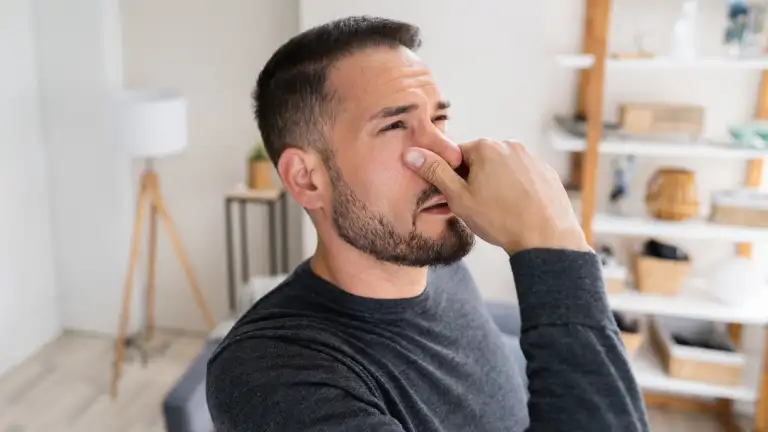
I've heard that if my neighbour's cannabis smoke or cooking smells drift into my home, there's nothing I can do. Is that right?
You're sitting outside on your patio, or maybe you’re inside with the windows open. Next thing you know, the air is filled with a smell coming from your neighbour’s home. Yikes! While we can choose where we live, we can’t choose our neighbours. But there are ways to make things better. Learn how to deal with a neighbour’s odours.
What you should know
“I smell my neighbour’s cooking most days. Especially when it’s fish or heavily spiced food. I love food, but it’s ... too much. I actually started to feel sick. I set up air fresheners and kept all the windows open. Then winter came. I finally had to say something. My neighbour was very surprised. She had no idea how much I could smell what she was cooking. She apologized and said she’d run her stove fan and open her windows while cooking. Together, we asked the building manager to improve the ventilation. I’m glad to be working on this together.”
– Liam, Abbotsford, BC

Sniff, sniff. What’s that smell coming from your neighbour’s home? It may be a pleasant one … or not.
Everyday living produces smells. We bake, we barbecue, we compost. Some people burn incense, lather on perfume, or smoke. Whether you like it or not, your neighbour has the right to do things at their home that give off odours. But you have rights too. So, what if the smells coming from your neighbour really bother you?
When a neighbour produces odours that unreasonably interfere with your right to use and enjoy your property, the law calls this a nuisance. Whether a smell is a nuisance or not depends on:
what’s causing it (or where it’s coming from)
how intense it is
how long it lasts
how often it occurs
how it affects your health and the environment
When an odour becomes a nuisance
Let’s look at an example. On a regular basis, a neighbour smokes on their outdoor patio, steps from your living room window. The smoke frequently drifts over, hangs about for a while, and regularly stops you from doing what you’re doing. It may even make you feel sick. You may feel anxious, too, about the impact of the second-hand smoke on your health. In this scenario, an odour is no longer just a drag. It could be considered an unreasonable interference of your right to use and enjoy your property — in other words, a nuisance under the law.
Not every odour will meet the nuisance bar. Claiming pain and suffering from the smell of fresh brewed coffee or home-baked bread, for example, is unlikely to be successful.
Also important: smell is a very subjective thing. Something that smells bad to one person may smell just fine to another. For something to be a nuisance, it must be shown to be a substantial and unreasonable interference in the eyes of an objective observer.
The nature of the neighbourhood can also be a factor
While some odours are part of everyday life, other odours may be typical for the neighbourhood. You’d expect to smell livestock, crops, and other farm-related odours in agricultural areas, for example, but not in a typical residential neighbourhood.
To bring a nuisance claim
To pursue a nuisance claim, you need to bring a legal action. That’s no small matter. We explain what’s involved — as well as other steps to consider — under work out problems, below.
BC doesn’t have a provincial law that regulates everyday odours. But many BC communities have local bylaws that come into play. Campbell River, for instance, has a bylaw that defines a “nuisance odour” as:
“An odour in the air that is harmful, poisonous, disgusting, repulsive, very unpleasant, offensive, or interferes with the use or enjoyment of property, endangers personal health or safety, or is offensive to the senses and causes inconvenience or annoyance to a person with a normal sense of smell.”
In that community, if an odour rises to that level, a person affected by it can complain to the municipality. The person causing the odour can be fined.
If you can’t enjoy your home because of an odour coming from your neighbour’s residence, check your municipality’s bylaws to see if any apply to your situation.
For information on the laws about odours in your community, you can call 3-1-1. You can also contact your local municipality directly, or check their website. Some municipalities have a way to submit an odour nuisance complaint online.
Find local bylaws relating to odours
On the website CivicInfo BC, you can search across local government websites province-wide to find local bylaws relating to odours in your community. In the search box, type in odour bylaw (or similar keywords) and the name of your community. For example, to find a bylaw for Vancouver, you could type odour bylaw vancouver.
“The couple in the neighbouring condo smoked cannabis every evening, saying it helped them de-stress. But the smell made me nauseous, and I worried about the effects of second-hand smoke. I talked with my neighbours, but it didn't change anything. I reached out to my strata council, and they sent my neighbours a letter reminding them of the building's no-smoking bylaw (and related fine). That made an impression. Now they go out for a walk to smoke."
– Justyna, Whistler, BC

The law relating to nuisance described above may help if a neighbour's smoking unreasonably interferes with your right to use and enjoy your property.
As well, other laws come into play with smoking. BC’s tobacco laws and cannabis laws limit where people can smoke or vape. For example, people can’t smoke or vape in an enclosed workplace or at public playgrounds or sports fields. In many communities, local bylaws further restrict where people can smoke or vape, such as on transit or in local parks.
But what about the neighbour who smokes in the privacy of their home? Are there other laws that can help if their unwanted smoke regularly travels into your home?
There may be, depending on:
the type of housing you live in, and
whether you’re a tenant.
If you live in a condo or an apartment
If you live in a condominium or an apartment building, BC’s tobacco laws and cannabis laws say that residents can’t smoke in common areas (like hallways and laundry rooms). Smoking is also prohibited within six metres of a doorway, open windows, or air intake of common enclosed areas.
Condos may also have their own non-smoking bylaws. (Or they may use the standard bylaws for stratas, which can be looked to for odour and smoking issues.)
Learn more about what someone living in a condo can do if a neighbour’s smoking is the problem.
If you’re a tenant
As a tenant, if you have a dispute about tobacco or cannabis smoke with your landlord or another tenant, you can look to the law of nuisance, as described above. As well, tenancy laws say tenants have the right to quiet enjoyment of their home. This includes not being exposed to unreasonable and ongoing second-hand smoke. Also look at your tenancy agreement. (Your landlord must give you a copy of it.)
If your neighbour is breaking the tenancy agreement or the law, you can take legal action. You may be able to get an order stopping the neighbour from smoking. In some cases, they may even have to compensate you for your suffering.
Learn more about what a tenant can do if a neighbour’s smoking is the problem.
Work out problems
You might have a smelly problem that’s come up between you and your neighbour. Sometimes, there are steps you can take yourself to fix things. For example, you might:
close your windows
tape electrical outlets and seal any cracks in the walls, light fixtures, and windows
use scented candles, buy an air freshener or diffuser, or boil up some vinegar or lemon
look into installing or improving a ventilation system or fan in your home
Improving air quality
The federal government provides residential indoor air quality guidelines and offers tips for maintaining and improving indoor air quality.
If you tried solving the problem on your own but it continues, you may be frustrated. What’s next?
One of the best things you can do is to talk with your neighbour. The whole issue may be news to them. They may simply not realize how much the odours from their smoking, cooking, or rotting compost, for example, have drifted and are affecting you and your ability to use and enjoy your home.
To plan for this conversation in advance, think about what you’ll say. The best reason to ask for a change is a medical condition or health concern (allergies, for example) that you or your children have. If that doesn’t apply, you could describe how, if smoking is the issue, your clothing and upholstery are absorbing so much smoke that people assume you’re a smoker or cannabis user yourself. (This could become an issue at work.)
Clearing the air, so to speak, can help your neighbour understand where you’re coming from and why you want their behaviour to change. Ask for their thoughts. Invite them to explore options that will work for both of you. If you are discussing cooking odours, keep in mind that you should never put down your neighbour, their ethnicity, or their heritage.
To help you prepare for the conversation, we offer tips for talking with your neighbour. We also have a template to prepare for the talk.
If you and your neighbour reach an agreement, you can follow up in writing.
If talking with your neighbour didn’t work (or wasn’t possible), and the problem continues, gather evidence to support your complaint. You might:
Take photos or a video. For example, if you’re concerned about smoke, take a photo or video showing just how much is drifting into your yard and home.
Make notes. Keep a log of the date, time, length of time, strength and type of odour you’ve been smelling. Describe any health issues.
Seek backup. Ask your doctor what impact the odour might be having on you. Or have a friend or family member come over and make notes of what they see or smell, including odours in your home, on your clothes, and furniture. You could even hire an expert in the field of air-quality testing. (Ask your neighbour to share the costs if you’d like.)
Do research. Check your local bylaws relating to odours, strata bylaws, or other related laws.
Stay organized. Keep all your evidence in one place, like in a file folder or on your phone or computer.
Once you’ve gathered your evidence, write a letter to your neighbour setting out your concerns. For example, let’s say your neighbour loves to cook. They also smoke cannabis. You find both odours unpleasant. In the letter, you could:
1. Explain your specific concerns and the impact on you
"The odours that drift into my home are very strong, last several hours, and seep into my clothes. I regularly get headaches and feel sick. And I can’t escape the smell — even if I keep my windows open all day."
2. Provide evidence of the problem
"Attached is a log I've been keeping to document the issues. I'll bring by a piece of clothing that has absorbed the smell."
3. Suggest ways the situation might be resolved
"Maybe when you cook, you could keep your windows open and stove fan on. Or maybe together, we could work to get the ventilation system improved."
4. Describe what will happen if they outright refuse
"I hope it doesn’t come to this, but I'm prepared to go to the landlord or the municipality."
We have a template letter you can fill out and give to your neighbour. It can be adapted to your situation.
If you’re unable to resolve the matter directly with your neighbour, consider mediation. This involves the two of you meeting with a neutral third party (a mediator). They’ll work to help you reach an agreement. Mediation is often quicker and less expensive than legal action. And it can help preserve a good neighbourly relationship.
Finding a mediator
You can search for a mediator based on the city or town you live in and the type of problem you have. On the ADR Institute website or the Mediate BC website, select community in the area of expertise or practice.
Still no results? If there’s a local bylaw relating to odours that’s being broken, you can file a complaint or ask the municipality to take action.
To file a complaint with your local municipality, you can call 3-1-1. Or you can contact your municipality directly. Many have complaint forms on their websites. Generally, when you make a complaint, you must provide your contact information, but it is kept confidential.
If none of the steps above have resolved the problem, it may be time to consider a nuisance action.
But think carefully about this option. Taking legal action can be a long, expensive, and stressful process. And there’s no guarantee you’ll win. For example, an odour may be permitted by zoning, or a court or tribunal may decide there isn’t enough evidence of a nuisance.
If you do prove your claim, you may get an order for compensation or an order requiring the neighbour to stop the offending behaviour.
If your claim is for less than $5,000 or is between neighbours that live in the same strata, you can bring it to the Civil Resolution Tribunal. This online system encourages a collaborative approach to resolving disputes. If you’re a tenant, you can bring your claim to the Residential Tenancy Branch.
Taking legal action against a neighbour will almost certainly strain your relationship — no small matter since you’re living next to one another. Think of it as a last resort.
Common questions
There could be a few reasons. Your neighbour:
May be permitted to smoke for medical purposes.
May have been living (and smoking) in the building since before the non-smoking policy was instituted — so they’re “grandfathered in.”
May be allowed to smoke because the non-smoking policy only applies to certain areas of the building and not actually to smoking in a unit. Take a closer look at your building’s non-smoking policy and bylaws.
Even so, your neighbour must still respect your right to use and enjoy your property. Ultimately, if your neighbour’s smoke is unreasonably disturbing you, your landlord should take steps to correct the problem.
It can be surprising and even upsetting if your neighbour tells you they’re affected by odours coming from your home. You have to decide what to do. You can:
Do nothing. But then you may have an angry neighbour and may have to deal with a complaint made to a third party or even a legal claim.
Take steps to deal with the problem. Let's say the issue is that you smoke and it's affecting your neighbour’s asthma condition. You might, for example, commit to smoking in another part of your home farther away from your neighbour, or while you're out for a walk.
You and your neighbour each have the right to use and enjoy your properties. But, if you do something to unreasonably interfere with your neighbour’s normal use rights, it can be considered a nuisance.
Usually, you’d speak directly to your neighbour (and, if applicable, your building manager or landlord). You may also report an air quality problem to your municipality. A troubling odour (related to drugs or a gas leak, for example) might warrant a call to police. But there are also other agencies you can reach out to, depending on the type of odour you’re concerned about.
| Issue | Who to contact |
|---|---|
| Outdoor air quality and odour complaints in Metro Vancouver | Metro Vancouver at 604-436-6777 or complain online |
| Outdoor air quality complaints outside Metro Vancouver | BC Ministry of Environment; for immediate health or environmental concerns, call 1-877-952-7277 |
| Backyard burning complaints | local fire department |
| Workplace indoor air quality | WorkSafeBC at 604-276-3100 |
| Indoor air quality health concerns | local health authority |
Who can help

Access Pro Bono's Free Legal Advice
Volunteer lawyers provide 30 minutes of free legal advice to people with low or modest income.

Access Pro Bono’s Everyone Legal Clinic
Clinicians provide affordable fixed-fee services on a range of everyday legal problems.

Lawyer Referral Service
Helps you connect with a lawyer for a complimentary 15-minute consult to see if you want to hire them.

BC Legal Directory
Search for a lawyer by community or legal issue. From the Canadian Bar Association, BC Branch.

ADR Institute of BC
Maintains a roster of qualified mediators and arbitrators who help with dispute resolution.


